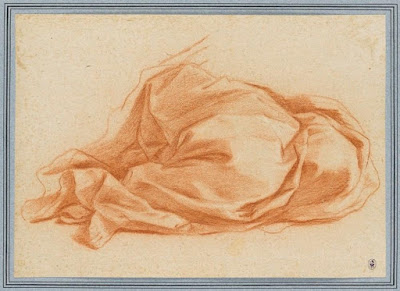 |
| Guercino (Giovanni Francesco Barbieri) Venus and Cupid 1632 detached fresco Accademia di San Luca, Rome |
 |
| Guercino (Giovanni Francesco Barbieri) Venus and Cupid 1632 drawing (drapery study) Staatsgalerie, Stuttgart |
 |
| Francesco Rosaspina after Guercino Venus and Cupid 1801 etching private collection |
"The Venus and Cupid was detached from the chimneybreast [at the Villa Giovannina outside Cento] at the end of the 18th century and replaced by a copy by the painter Rondelli da Urbino (1759-1848). In the legend to Francesco Rosaspina's print of 1801 [directly above] after Guercino's fresco, it is said to be detached, but still hanging over the fireplace. Later the Aldrovandi family gave it to the pope, who put it on display at both the Pinacoteca Vaticana and the Galleria Capitolina; in 1836 it was given to the Accademia di S. Luca, Rome, by Pope Gregory XVI (Cappellari) (reg. 1831-46)."
 |
| Guercino (Giovanni Francesco Barbieri) Magdalene contemplating the Nails of the Passion 1632 oil on canvas private collection |
 |
| Guercino (Giovanni Francesco Barbieri) Magdalene contemplating the Crown of Thorns 1632 oil on canvas Fondazione Sorgente Group, Rome |
 |
| Guercino (Giovanni Francesco Barbieri) Portrait of Francesco d'Este, Duke of Modena 1632 oil on canvas (cut down at sides and top) private collection |
 |
| Matteo Loves after Guercino Portrait of Maria Farnese, Duchess of Modena (lost painting, known from copy) after 1632 oil on canvas Musées d'art et d'histoire de Genève |
"[Carlo Cesare] Malvasia mentioned a commission to paint a pair of full-length, life-sized portraits of the Duke and Duchess of Modena among Guercino's assignments for 1633, though they were actually finished by the end of the previous year. The painter was handsomely rewarded, receiving 630 scudi on 31 May 1633, a sum that likely also covered the fee for two pairs of copies to be painted by his pupils under his supervision."
 |
| Guercino (Giovanni Francesco Barbieri) Elisha resuscitating the Son of the Shunammite Woman 1632 oil on canvas Quadreria Arcivescovile, Milan |
 |
| Guercino (Giovanni Francesco Barbieri) Elisha resuscitating the Son of the Shunammite Woman 1632 drawing (compositional study) Teylers Museum, Haarlem |
"The picture [of Elisha resuscitating the Son of the Shunammite Woman], missing from Malvasia's account, is documented by a payment of 150 scudi received on 16 February 1633 from the padre generale of S. Biagio, Bologna. It must soon have passed into the possession of the keen collector Cardinal Cesare Monti (1593-1650), Archbishop of Milan from 1632 to 1650, some of whose pictures are in the Museo Diocesano, Milan. In 1737 Serviliano Lattuada (1704-1764) gave a detailed description of the work, then housed in the Galleria Monti of the Arcivescovado, Milan."
 |
| Guercino (Giovanni Francesco Barbieri) Stigmatization of St Francis 1633 oil on canvas (trial version) private collection |
 |
| Guercino (Giovanni Francesco Barbieri) Stigmatization of St Francis 1633 oil on canvas (finished version) Chiesa di San Giovanni Battista di Campello Monti |
 |
| Guercino (Giovanni Francesco Barbieri) Stigmatization of St Francis 1632-34 oil on canvas Chiesa di San Bernardino, Piacenza |
"Due to its location in a damp building over the centuries, the Piacenza altarpiece [directly above] is now little more than a ruin of its former self. Davide Gasparotto documented the restorations undertaken to remedy its slow deterioration. In 1684, the Genoese painter Domenico Piola (1627-1703) repaired and touched in what he could; it was patched up again in 1739 by Giovanni Battista Licini (dates unknown), who relined the canvas; and in 1821 it was again restored, this time by the local portrait painter Luigi Gambarelli (dated unknown). The results of a more professional restoration carried out in 1980 were published by E. Frattarolo. Despite this long, worthy history to preserve the painting, as Denis Mahon rightly observed, it is to all intents and purposes 'lost' as a work of art."
 |
| Guercino (Giovanni Francesco Barbieri) St Joseph with the Christ Child 1633 oil on canvas Lauro Collection, Bologna |
– quoted texts from The Paintings of Guercino: a revised and expanded catalogue raisonné by Nicholas Turner (Rome: Ugo Bozzi Editore, 2017)
